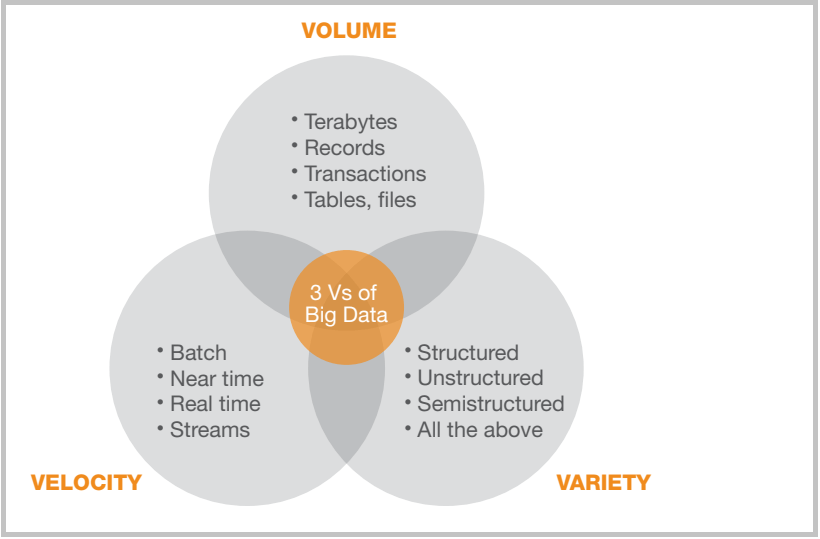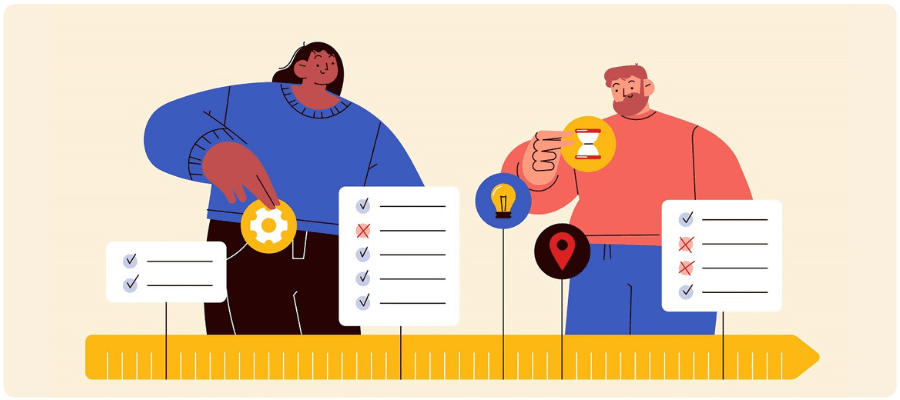Big data allows event marketers to collect and analyze large amounts of customer data to gain insights into customer behavior.
Result?
Event marketers can take data-driven decisions to optimize their event marketing campaign and provide a better experience to event attendees.
📌 In this guide, you will learn:
- What is big data
- How big data is impacting event marketing
- Key predictsions about the role of big data in event marketing
- Final words
Let’s get started.
What is Big Data?
Big Data is a large amount of data, i.e., structured and unstructured, both in high-volume, high-velocity, and different varieties of data that collect from many sources and used by companies to analyze the big data and find meaningful insights that help businesses to understand market needs and make profitable business decisions.
📌 Related technology glossary terms
- What is Artificial intelligence
- Beginner’s guide to machine learning (ML)
- Business intelligence definition
Big Data contains three V’s, i.e., Volume, Velocity, and Variety. Due to a large number of complex data sets, it’s impossible to analyze big data with traditional methods.


“Most defnitions of big data focus on the size of data in storage. Size matters, but there are other important attributes of big data, namely data variety and data velocity.
The three Vs of big data (volume, variety, and velocity) constitute a comprehensive defnition, and they bust the myth that big data is only about data volume.”
– Philip Russom (author of Big Data Analytics)
Let’s discuss the three V’s of Big Data:
1. Volume
Big Data represents the large volume of data. In today’s world of social media platforms like Facebook, Instagram, Twitter, LinkedIn, Pinterest, etc., help users to generate a volume of data daily. It’s estimated that 2.5 quintillion bytes of data are produced by users each day, according to SeedScientific.
This large volume of data is known as big data. Many giant companies contain large volumes of data produced by their users. For example – Facebook has 2 billion active users, YouTube has 1 billion users, Twitter has 350+ million users, and many other platforms where millions of users are spending their time actively and generating content every second.
2. Velocity
Velocity is known as the speed of data generated and the speed of transmitting data. For example, Facebook users upload 350 million photos per day, and 500 million tweets are posted on Twitter per day and many other platforms where users generate large amounts of data in seconds, representing Velocity.
For companies, it’s very important to see how quickly they’re getting data. So that they can store, distribute and process the data faster to find something meaningful and make profitable business decisions.
3. Variety
There are different formats and varieties of data generated by users, including audio, video, text, images, pdf, excel, CSV, and many more, and the collection of varieties of data is known as big data.
These varieties of data can be structured, semi-structured, and unstructured. Companies need to identify the property of data and separate it into similar categories for easy analysis.
How is Big Data Impacting Event Marketing?
The event industry will grow to $1,552.9 billion by 2028, according to Truelist. After COVID-19, the way events and conferences are conducted changed, and people have already adapted to this digital boost.
The companies conducting these events and meetings leverage big data to understand market needs, target potential customers, increase event engagement, and make meaningful decisions.
Let’s find out how big data is impacting event marketing!
1. Target Potential Audiences
When it comes to event marketing, it becomes essential to get in front of those potential audiences who have similar interests and are easy to convert without spending lots of money on advertisement.
This is where the use of Big Data comes in helps companies to collect & analyze the data to identify where (sources) most of the audiences join the events and the best possible ways to target them.
In simple words, by analyzing big data, companies can understand their dos & Don’ts and make strategies to get desired results.
Example:
While doing extensive data analysis, it shows a survey that displays the main source of interested audiences, which type of advertisement brings their attention and the marketing platform. With the help of this data, it’s easier for any company to make the right strategy and run campaigns without spending extra effort and money.
2. Event Planning
The simplest way to make the event successful is to bring only those speakers that your audiences want to see. With big data analysis, it’s easier to identify the customer’s interested speakers, topics, and problem solutions they want.
When companies are planning their events, first they analyze big data to understand their customers’ needs and interests and then figure out the best possible ways to cover all the parts of the event to increase customer engagement.
Example:
When an event company analyzes the big data, it shows a survey that tells the customer’s interest, sources of enrolling events, their favorite speakers, interesting topics, and everything required to conduct future events and solve their problems.
With all this helpful information, event planning becomes easier and faster.
3. Personalized Experiences
To enhance the user’s experience better & efficiently, companies try to analyze their big data and learn about their customers’ behavior, interests, patterns, and demographics like age, gender, occupation, location, etc. This information then helps companies to find their potential customers and plan for upcoming events with their interest and easy process.
Also, knowing your customers can help to make powerful marketing strategies to catch customers’ attention and encourage them to join upcoming events and conferences.
4. Improved Crowd Controls
Whenever any event or conference is conducted at any place, some areas can be dangerous for attendees. To avoid these zones, event planners have to manage the crowd continuously. But big data can be a fast solution for event planners.
By analyzing the big data, they can understand where the restricted zones and safe places are so that it becomes easier to make a specific layout for the crowd to keep them away from restricted areas and let the audience see the event or conference more effectively.
5. Real-time Adjustments
With big data analysis, event professionals can understand the attendee’s behavior, their interest, and possible areas to get better engagement with them. These data help to make real-time changes according to the attendee’s requirements and make the event or conference more engaging and interactive.
Also, it helps to identify what the attendees expected from the event or meeting and the best possible way to deliver the solution to their problems by setting them up according to them.
And many more impacts of big data on event marketing enhance the experience and growth and help to make the event or conference successful.
Big Data Predictions for Event Marketing
Thanks to Digital Era, which takes the event from offline to online platforms, companies are leveraging the power of Big Data to understand market needs, potential audiences, and best upcoming events planning.
The Event Marketing Industry size is expected to grow 11.2% from 2021 to 2028, according to statistics.
Companies mainly use Big Data for predictive analysis. Predictive Analysis means predicting the future demand and market needs based on the current database. Analyzing any specific data category can make many predictions for future possibilities.
Let’s see the predictions for Event Marketing with Big Data:
1. Virtual Conferencing
After COVID-19, Virtual Conferencing is becoming a new trend, and almost 74% of people prefer to have online conferences. Because of its feasibility, accessibility, and low cost, most users easily adapted to this digital shift.
Virtual events and conferences are becoming integral to our existence, and there’s no turning back.
2. Serializing Events for Stickiness
The demand for virtual events is growing rapidly after the pandemic. That’s why many event planners are coming with back-to-back virtual events for their audiences.
By collecting and analyzing big data, event planners are figuring out their audience behavior, Interest, topics, and demographics that helps to conduct upcoming events more relatable, engaging, and trending.
3. Optimizing Return On Investment
Virtual events are more cost-effective, easy to organize, and fast adaptable than physical events. Event planners are getting high ROI by conducting virtual events.
To make the event more successful and profitable, they’re leveraging the power of big data analysis to find out what their audiences want to fulfill and the best possible ways to solve their problems in virtual events and conferences.
4. More Opportunities to Monetize Events
Virtual events and conferences are opening new opportunities to monetize events differently. When event planners plan to conduct virtual events, there are many ways to monetize, including selling tickets, upselling, various types of tickets, pre-booking, and any downloadable resources.
There are no limits on attendees because it’s a virtual event, and many people can attend these sessions compared to offline events. So the monetization opportunities are higher in virtual events and conferences.
5. Safety becomes Top-Priority
When COVID-19 hit, the first thing that shut down were these offline events and conferences that spread the corona at high speed, and safety became a most important priority after the relief pandemic.
This is why the concepts of virtual events and conferences become easier to adapt due to safety for speakers & attendees.
Virtual events and conferences are the future, and their demand is increasing because of a safe environment and touchless communication.
Final Words
The global Big Data Analytics market will be worth $655.53 billion by 2029, according to fortunebusinessinsights. Big Data is now playing a crucial part in the Event Marketing Industry. With big data, event planners enhance attendees’ experience, understand market needs, and make powerful event marketing strategies.
Also, big data helps to understand audience interest and deliver a personalized experience in virtual events and conferences that build more engagement and successful events.
We hope this guide will help you to understand the importance of big data, future possibilities of event marketing, and how to use big data to enhance upcoming events.
📌 Supplementary resources
- An overview of big data analysis
- Adaptive Integration Algorithm of Sports Event Network Marketing Data Based on Big Data
- Customer relationship management and big data enabled: Personalization & customization of services
10Pie Editorial Team is a team of certified technical content writers and editors with experience in the technology field combined with expert insights. Learn more about our editorial process to ensure the quality and accuracy of the content published on our website.

